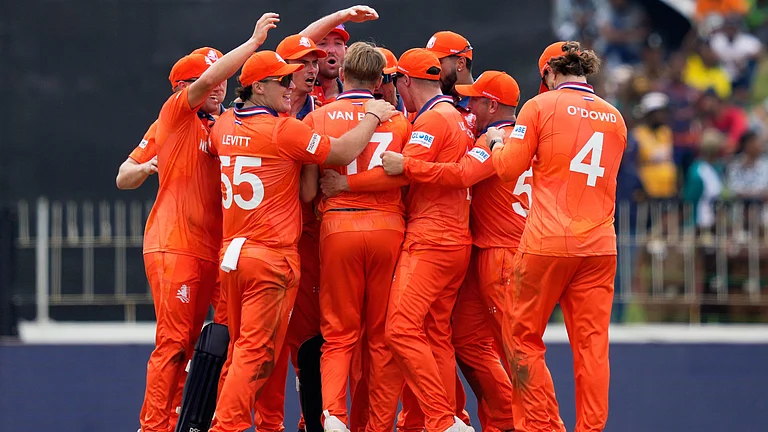My sojourn is short, all of five days. And China is vast. Complex. The images I carry back have a kaleidoscopic quality. Yet, each is distinct, vivid. And powerful in impact.
Three cities. Beijing, large, sprawling, with the grandeur of Tiananmen Square and the Forbidden City. Shanghai, bustling, Bombay-like, with its colonial buildings and teeming waterfront. Wuxi, quiet, provincial, with the enormous Tai lake and beautiful wooded hills surrounding it.
The progress and modernity amaze. The expressways are wide and well laid out, with limousines of European origin zipping past. And yet my host in Shanghai, a senior functionary of a large trading house, wanting to summon his chauffeur asks me to locate the horn for him on the cars steering wheel.
That is my enduring impression of China, a sort of half-way house to the elusive Marxian dream. Classless, at least in part. The chauffeur who drives me to the banquet in my honour sits next to me at the table, picking delicately at his food with chopsticks. The host companys director rides in an Audi during working hours, but cycles to work like the others. When the same director escorts me in person to tour the sights of Wuxi, his awe-struck interpreter whispers in my ear: "It is an honour. A great honour." The director is also a senior party member, I am told, a man of great power.
Mention of Chairman Maos name evokes irreverent giggles from the younger generation. The old folk, who have by now graduated from grey lookalike mao suits to trousers and shirts, treat the Great Helmsman with more respect. The chairman is still very much around and not merely as a giant portrait on the rostrum that overlooks Tiananmen Square. He is present, all 60 ft of him, at the park that centres the driveway at the entrance of each factory I am invited to.
My visit is near perfect, with the right balance of pleasure and work, involved negotiation and good dining, visiting factories and offices. The dictum of customer orientation has been adequately internalised in China, it seems, for I am a customer, buying machine tools for our ball bearing factory in India. And no ordinary customer at that but a provider of foreign exchange, which makes me all the more significant. Exports is the magic word in China. They vie with each other for my custom the trading company that first opened its doors to us three years back and the producing factory that now is permitted to export on its own.
It is in a sense of natural for me to move towards the debate that is raging in the developed world India and China, and their comparative states of development. Almost dutifully, I observe, sift and analyse.
Take my train journey from Shanghai to Wuxi and back. The platforms are clean, uncluttered, free of milling crowds. Strange, in a country even more populous than ours. Picture a waiting room almost an acre in area, filled with rows of moulded plastic chairs. And they sit and wait, obediently. Only the passengers. No see-ers off allowed. They move to the platform when their particular train in announced.
Or take Shanghai. A congested metropolis now ringed by an elevated six-lane expressway over 70 km in circumference. Reducing the journey from the city centre to the airport by half.
They have had few problems with electricity, say people at the factory I was visiting. The factories are gargantuan. Large portions of each are primitive in appearance, full of clutter, grime, soot. Smaller sections are well laid out, with a sense of neatness and industrial well-being that emanates from the fundamentals of excellent product quality. These house the joint ventures, mostly with prominent European names, German, Swiss, French and British. The primitive and the modern coexist peaceably and I come away with the conviction that it is not a question of whether the more antediluvian portions can be brought up to date but when.
This is the essential difference as I see it. The solid, real-time investment in infrastructure roads, rail services, electric power, communication that urban, industrial China has achieved. Infrastructure that provides a springboard from which progress becomes easy.
The thoughts pursue me as I sit down for a banquet on that last evening in China. Cuisine, Wuxi style, is very different, from other provincial cookery. Much toasting follows, and a procession of exotic fauna. As I down the last of my beer, my host, the director, turns to me. "And now, a surprise," he says.
A karaoke mike is brought in. The television in the corner is switched on. The oldest person at the table, the factorys engineering chief, picks up the mike and starts singing. "Aawar Hoon,.." he croons. He is tune and word-perfect which puzzles me till I notice him reading from the calligraphic script on the screen.
I applaud lustily at the end of the song and he tells me, "Raj Kapoor. I watched it four times. We loved Hindi movies. Until the war came, that is." An export opportunity in the offing, perhaps. Who knows?


























